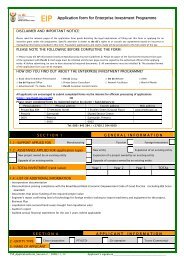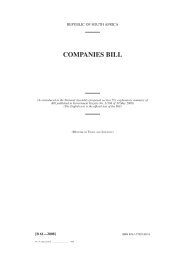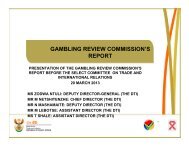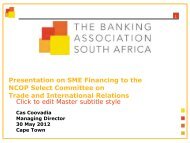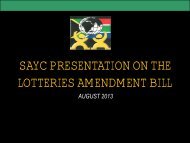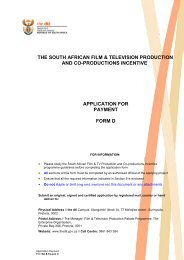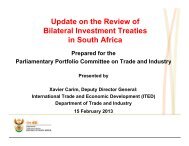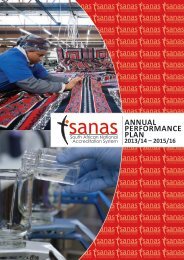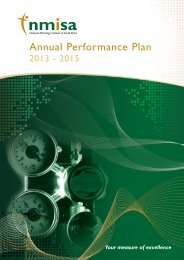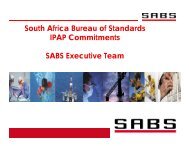Copyright Review Commission Report - ICT Law and Regulation ...
Copyright Review Commission Report - ICT Law and Regulation ...
Copyright Review Commission Report - ICT Law and Regulation ...
- No tags were found...
Create successful ePaper yourself
Turn your PDF publications into a flip-book with our unique Google optimized e-Paper software.
8.1.6.2. Currently, there is a pending court case between SAMPRA <strong>and</strong> some of the major retailers with regard tothe magnitude of tariffs proposed by SAMPRA in respect of sound recordings. Their payments arecurrently being paid to an ‘escrow’ account. Based on the comparative exercises, the local tariffs forretailers are not higher than the international average.8.1.6.3. Although SAMRO has been in operation for about 50 years, there are still a significant number of usersthat are not in possession of SAMRO licences. According to SAMRO, the following categories of users donot pay for the use of music rights: Internet service providers (ISPs), digital service providers,narrowcasters, most of the community broadcasters, some government departments (e.g. CorrectionalServices, the South African National Defence Force), taxis (taxi associations) <strong>and</strong> some parastatals (e.g.Transnet <strong>and</strong> the South African Post Office). It is estimated that at least 50% of taxis play music as part oftheir operation <strong>and</strong>, according to SANTACO, there are approximately 130 000 units in operation. Based onthe current tariffs, the taxi industry should be paying at least R43 million per annum for music rights(R20 million for performance rights <strong>and</strong> R23 million for needletime rights). According to one of thesubmissions to the CRC, SAMRO does not collect royalties from churches for the use of copyright musicduring services. SAMRO is expected to maximise income for its members <strong>and</strong>, where there areexceptions, the m<strong>and</strong>ate should be sought from the members.8.1.6.4. According to SAMRO, the reasons for non-payment include: Inadequate <strong>and</strong> ineffective legislation; National culture of non-compliance; Cumulative effect of cost of licences for multiple rights; Commercial viability of community radio broadcasters; <strong>and</strong> Cost <strong>and</strong> difficulty associated with enforcement.8.1.6.5. SAMPRA has licensed about 4 000 users (or about 12 000 sites) for sound recordings. This is too low inrelation to the number of commercial music users in the country. Based on the current list of SAMPRA’slicensed users, the following categories have not been licensed: telephone music-on-hold for biggercorporations, municipalities, bigger portion of restaurants, universities, music schools <strong>and</strong> others.Excluding broadcasters <strong>and</strong> retailers, who are disputing the tariffs, the CRC believes that SAMPRA iscurrently collecting only a third of what it should be.8.1.7 Mechanical RightsSAMRO <strong>and</strong> NORM are responsible for collecting mechanical rights. One of the main challenges is the overlap ofmembers between SAMRO <strong>and</strong> NORM <strong>and</strong> there is a claim by some of the users that they are being charged twice forone <strong>and</strong> the same repertoire of songs. In order to eliminate this potential duplication of functions <strong>and</strong> payments, SAMRO<strong>and</strong> NORM are considering merging their mechanical rights operations. The current challenges in this area include:8.1.7.1. Non-payment by the SABC of all mechanical rights for the last 18 months amounting to approximatelyR18 million (payable to both NORM <strong>and</strong> SAMRO). The amount has subsequently been paid.8.1.7.2. Over the past five years, private television stations have not paid SAMRO for the use of its repertoire.8.1.7.3. Vodacom <strong>and</strong> MTN did not pay SARRAL (or SARRAL’s liquidators) for its share of mechanical rights.- 57 -



